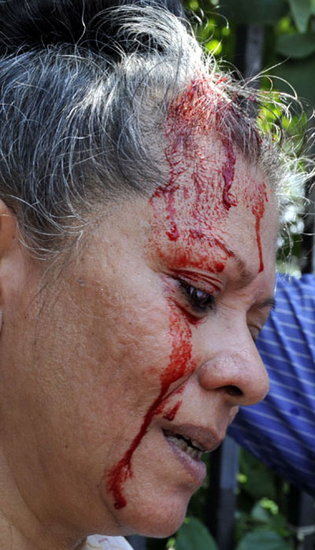Subscribe to ShahidulNews

DHAKA: Renowned writer, researcher and activist Rahnuma Ahmed asks who is a ?foreign agent?, Anu Muhammad, member-secretary of the National Committee to Protect Oil, Gas, Mineral Resources, Power and Ports, or Dr. Tawfiq-e-Elahi Chowdhury, advisor to the Prime Minister on energy affairs?
Rahnuma was talking to banglanews24.com in an exclusive interview against the backdrop of the National Oil and Gas Committee`s siege of the energy ministry on June 14, 2011, police prevented the seige from taking place, Rahnuma was injured in clashes when police resorted to clubbing and lathi charge.
She raised this question when asked about the recent comments made by Dr. Hasan Mahmud, state minister for environment and forest, in the parliament about the oil and gas national committee, and about Anu Muhammad in particular.
Dr Hasan Mahmud told lawmakers, Anu Muhammad is a ?foreign agent,? and that the Oil and gas Committee was formed by `tokais` (street urchins) after the committee called a half-day hartal on July 3 in protest against the deal inked between the government and the US-based company ConocoPhillips for offshore oil and gas exploration. The contract includes the provision of gas export.
banglanews24.com?s Output Editor Mahmood Menon took the interview.
banglanews: Why do you think Bangladesh should not export its oil and gas?
rahnuma ahmed: I will mention only one reason because of space and time constraints, but before that I want to draw your attention to a basic issue. Natural energy resources are limited. They are non-renewable. They get depleted. And that`s why it`s essential that these should be made use of in a planned manner, that we need to seriously consider the issue of national reserves, our needs, how the national interest can best be secured, you know, these matters, that policies and plans of action should be well-thought out, well-planned.? Let`s talk of gas, national reserves are estimated to be 7.3 trillion cubic foot. According to the latest estimates, the daily shortfall of national energy needs is 450 million cubic foot. The demand for gas is increasing at an annual rate of 10%. According to government forecasts, gas reserves are likely to run out by 2014-2015. This is the picture.
Now, the government is continuously saying that drilling, and excavation, of oil and gas is essential for the country`s development, that we need to do this for the sake of increasing industrial production in our mills and factories, in order to raise the general standard of living so that people have greater access to electricity in schools, colleges and hospitals, in homes, etc. etc. At the same time, the government is saying that since Bangladesh is poor, it means that we do not have the capital, nor the technology, nor required skills etc. etc. to undertake it ourselves, that we have no option but to lease out gas blocks to foreign multinationals
Now my question is this, if the energy resources which will be generated are destined for export, then how does the government expect development to occur? How will export lead to a reduction of the nation`s energy shortage? And we need to bear in mind that the profit which is obtained from export benefits the lessee, that is, the multinational company, and not the government.
The government claims that gas will only be exported if we cannot make use of it, that we have claims to 80% of the gas excavated, but this gives rise to further questions, since we will have to purchase gas, our gas, from multinationals at the international market rate, then why this rush to lease out our gas blocks? Why not, instead, buy gas from gas-exporting countries such as let`s say Myanmar, from where we can buy gas at the same price, and leave our deposits for future generations who, by then, will surely be able to extract it nationally? Surely, Bangladesh is here to stay, and isn`t this the wise thing to do?
It`s common sense, but apparently this common sense does not percolate to those in the government such as, the prime minister`s energy adviser, high-up officials in the energy ministry, the chairman of Petrobangla. Why?
banglanews: Is there any international model model in front of us, one that we can aspire to, a country which has been successful in protecting its oil, gas and mineral resources?
rahnuma ahmed: Of course, there`s China, there`s Malaysia. They have built their own institutions, these have enabled them to assert and retain control over their own resources. There are other models as well, Venezuela, Bolivia, their situation was similar to many African countries , but in recent years they have reclaimed and asserted control over their energy resources. Foreign companies now either have to agree on their terms and conditions, or pack up their bags and leave. And in that sense, these instances from Latin America are more important for us, because they prove that political will, matters.
banglanews: Doesn`t the contract with ConocoPhillips have anything positive in it? If so, what are these?
rahnuma ahmed: How do I know? It`s secret! The government hasn`t publicly disclosed any of the contracts signed with multinational companies so far. No government has, neither the Awami league-led present government, nor the BNP-Jamaat led previous government.
There has not been any discussion about any of the contracts signed in the parliament, none of these contracts have been placed before the law-making body. Nor has the Parliamentary Standing Committee on energy seen any of the contracts! Why this secrecy?
When the issue of secrecy over contracts is raised, a diversion is created, the PSC model-2008 is waved before us. But that is a production sharing contract, it is not the signed document outlining the specific terms and conditions of the deal which takes place between the government and the multinational. The PSC model-2008 was uploaded on the internet during the military-installed caretaker government, the Moeenuddin-Fakhruddin era (2007-2008), so that international oil companies (IOCs) can bid for exploration. It was not uploaded, mark you, to inform the public, or to? elicit comments from members of the public.
When demands are raised to see the contract, top officials of the energy ministry or the Petrobangla chairman wave pages of PSC-2008 at us. They think we are a bunch of fools!
banglanews: We want to protect our national energy supplies and ports from the invasion of foreign forces… but do we have the ability or the skills to benefit economically from our resources?
rahnuma ahmed: Bangladesh is an undeveloped country, we do not have either the ability or the skills as do developed nations?these simplistic assertions just don`t hold. The best example is provided by Magurchora and Tengratila. Occidental and Naiko combinedly have wasted 500 billion cubic feet of gas. Ninety acres of land was destroyed in Magurchora due to the explosion. Bela (Bangladesh Environmental Lawyers Association) estimates the damage to be worth 100 million dollars. Naiko eventually paid out $525,000 in compensation to about 620 families who were affected by the disaster, and another $100,000 for planting trees, which is only 0.65% of the total damage. Just imagine!
On the other hand, Bapex`s track record is far, far better than that of multinationals, they have excavated gas safely, no major disasters, no such explosions. But despite this, instead of allocating funds to Bapex to make it stronger and more efficient, governments have undertaken policies that have weakened it as an institution. Which means that if we view the entire natural resources saga as a simple story of development vs. underdevelopment, we will be reproducing exactly what powerful forces would like us to believe.
banglanews: On 19 June, the state minister for environment and forest Dr. Hasan Mahmud said in parliament that Anu Muhammad, member-secretary of the National Committee to Protect Oil, Gas, Mineral Resources, Power and Ports is a `foreign agent`, that he and his fellow members are tokai (street urchin). Would you please comment on that.
rahnuma ahmed: Well firstly, I do not share our gentleman minister`s hatred toward `tokais,` he speaks in the language of class arrogance.? The so-called tokais are politically conscious, they have proven that repeatedly. They contribute generously toward cleaning up the urban environment, which is more than I can say of the minister! The number of homeless children is increasing alarmingly, but it is apparent from the utter disregard and contempt with which he speaks that government actions, or inactions, that lead to impoverishment and uprootment, that deepen social inequality, does not concern him. I`m neither surprised nor shocked, it is only to be expected.
He not only labelled Anu Muhammad a `foreign agent` he did so despicably, in an utterly revolting fashion. That speaks of his orientation, the cesspools of his mind, I will not dwell on that, instead, I want to focus on the `foreign agent` issue. Did the WikiLeaked cables revealed from Dhaka`s US embassy last December name Anu Muhammad, or did it name the prime minister`s energy adviser Tawfiq-e-Elahi Chowdhury? Who did the US ambassador James Moriarty tell to award offshore gas blocks to ConocoPhillips, to Anu Muhammad, or to Tawfiq-e-Elahi Chowdhury? Who obliged accordingly, Anu Muhammad, or Tawfiq-e-Elahi Chowdhury?
I insist, no, demand, that the minister answer these questions. Is it not utterly outrageous that there has been no official response to the WikiLeaked Dhaka cables? Its been six months now, and now this minister, because the government is unable to answer for its misdeeds, comes up with such utter trash?
When the people of Phulbari had risen up and kicked out Asia Energy with their open pit coal mining project, when 3 people had been killed because paramilitary forces had opened fire on locals who refused to part with their land and livelihood, Sheikh Hasina who was then leader of the opposition, had gone to Phulbari. She had pledged public support to the people`s demand, and had later lent support to the National Comittee`s hartal. She`d also said during her speech at Phulbari Government College`s premises, `if I had agreed to hand over natural resources to foreign companies, I could have become the prime minister.` Shouldn`t people have the courage to come forward and ask her what she had meant?
Protecting and conserving natural resources, the nation`s energy security, these are issues that are intertwined, inextricably so, with the issue of Bangladesh`s sovereignty.
This article was published on June 21, 2011 by banglanews24.com
http://www.banglanews24.com/English/detailsnews.php?nssl=88e8a96c7c5192b45e78d97a87641b7f&nttl=2011062121661
BDST 2330 HRS, JUN 21, 2011





Leave a Reply
You must be logged in to post a comment.